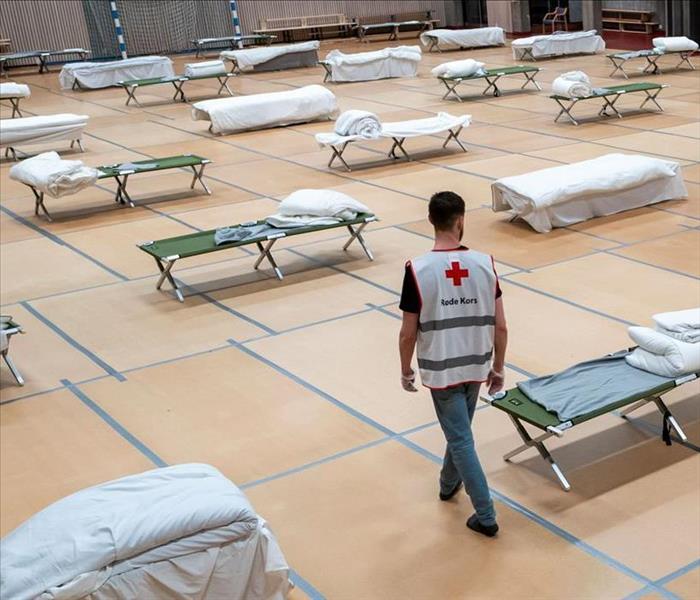What to Expect at a Central FL Hurricane Shelter
6/22/2021 (Permalink)
 Retreating to a hurricane shelter in the event of a hurricane be a safe choice but also confusing. Knowing what to bring and expect can help.
Retreating to a hurricane shelter in the event of a hurricane be a safe choice but also confusing. Knowing what to bring and expect can help.
Going to a Shelter for Safety in the Event of a Hurricane
Hurricanes can be deadly and destructive. Hurricane winds and waves can severely damage and destroy homes, produce heavy rain and flooding, and can flood whole communities. Hurricanes produce dangerous rip currents along the Florida and Georgia coasts and bring up to 5-foot storm surges. In general, pay attention to your neighbors' safety because everyone's needs may be different.
- What are the signs of a hurricane? Sea-level water becomes higher than normal, and the winds start to blow.
- What should people do during a hurricane? Be aware of the emergency, and make sure you are fully informed. Listen to radio and television for announcements.
- During a hurricane, if you are inside, get in a doorway or a closet away from doors and windows. Stay away from windows.
- If you are outside and in your car, buckle your seatbelt and secure your hood. Pullover as far as possible from buildings and trees.
- If you're in a boat, get out. Don't tie yourself down or put anything around your waist that might get caught in the lines of a boat.
- Remember: There is a life-threatening risk to you, your family, and your neighbors during a hurricane.
When it comes to water safety, the first and foremost rule is to know how to swim and do it well. You should have a swimming life vest at all times, and when possible, you should also have a waterproof one. The next most important safety step is to know how to float if you get into trouble. You need to remain calm and think. If you are calm, you will be better able to swim to safety. Also, make sure to have a first aid kit and any necessary medications with you, just in case you have to cut a limb or are otherwise injured. You should also remember that a life jacket or life ring is necessary if you are stuck in a boat. All boats should be appropriately stowed and anchored well.
How to be prepared for a hurricane
Put together a hurricane plan. Make a family communications plan: purchase flashlights and extra batteries. Have supplies that can serve you for at least three days. Don't forget an emergency kit. Remember, no one knows when a hurricane will strike. Make a plan to stock the kit with the right items and store it in a safe place—store three days' worth of water, food, medications, and pet food.
Among the ideal methods to prepare for a hurricane is to buy or build a safe boat. Then, practice navigating. Once you know how to navigate your boat in a hurricane, you'll be less likely to get lost. If you live near the coast, you'll need to add your stock. You should have supplies on hand, including:
- Bottled water
- nonperishable food
- baby food
- bath toys
- flashlights
- money
Don't forget the pets! Bring them with you to the shelter or keep them at home if you live in an evacuation zone.
Winding Up
Hurricanes are very dangerous, especially since they are centered in warm water. They are also often fueled by an abundance of warm water. There are many of them in the Atlantic basin each year. As you can see, a hurricane can easily devastate a community. What other disaster preparation strategies would you add to this list? Do you know other tips for hurricane survival?
Hurricane shelter options for central Florida – Volusia County, Seminole County, Orange County, and Osceola County.
- Stop the power – Do not touch any power lines. Keep clear of anything touching a downed power line. Avoid driving into flooded roadways.
- Always keep your pets at home during a hurricane because strong winds will blow things around. If you decide to leave your home for shelter, make sure to bring your pets with you!
- When faced with an emergency, be prepared to act quickly and decisively.
- Stay away from windows and try to avoid the corded phone is damaged during the storm. A battery-operated radio will provide vital information and will help people to know what to do.
- If you've any medical challenges, don't drive. Instead, walk to a shelter or a hospital. Do not drink alcohol while drinking water.
- Listen for evacuation notices and calls from your local emergency managers.
- Listen for the sounds of the house as it struggles to withstand the wind and rain and falling trees.
- Use a room of sturdy construction. If you have a safe room in your house, then make sure to put this room ready. Ensure you have enough blankets, pillows, and other items.
- Always carry your emergency supply kit. Use candles as a backup power source. Buy a can opener.
- Make sure you have up-to-date emergency supplies at your homes, such as candles, nonperishable food, and a battery-operated radio.
- Do not store your generator in your home because it can overheat. Don't work on generators indoors.
- Please make a list of important family members and have them updated. Be prepared to evacuate quickly.
Let the storm pass and begin to rebuild. Ensure you don't get overwhelmed by the emotional aspect. Even if you do lose everything, you will survive and will be much stronger and more resilient. To perform storm damage service consider SERVPRO of University, SE Orlando.





 24/7 Emergency Service
24/7 Emergency Service